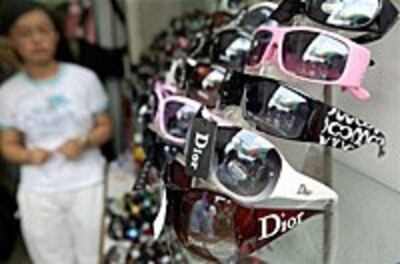
China has destroyed millions of pirated products in a recent crackdown on counterfeit goods, but analysts say the campaign is unlikely to produce lasting results.
In one of several well-publicized events, Chinese state media published photos of a bulldozer crushing thousands of illegally copied audio and video discs on Dec. 8. The CDs and DVDs were among 37 million seized in the second half of this year, according to the official Xinhua news service.
The push to protect intellectual property rights (IPR) coincided with the visit of a top-level delegation of U.S. officials for two days of strategic economic talks Dec. 14-15.
China’s copyright violations were expected to be a major issue for the U.S. mission, which included U.S. Trade Representative Susan Schwab and the secretaries of Commerce, Energy, Labor, and Health and Human Services, as well as Federal Reserve Chairman Ben Bernanke and Environmental Protection Agency Administrator Stephen Johnson.
A stronger effort has to mean building incentives into the system, so that at the provincial and local level there will be watchfulness by governors instead of complicity in counterfeiting.
No big breakthroughs
But the talks in Beijing yielded no major breakthrough on IPR, which took a back seat to concerns about exchange-rate policy and China's controls on its undervalued currency, the yuan. The two sides agreed only to "invigorate ongoing work" on IPR, trade, and other key issues, the U.S. Treasury Department said in a statement.
According to a recent report by the U.S.-China Economic and Security Review Commission, counterfeit items may account for 15 to 20 percent of all of China’s manufactured products, contributing eight percent of the country’s GDP.
In interviews with Radio Free Asia, experts voiced doubts that China’s new anti-piracy campaign would do more than scratch the surface of the problem.
Gary Hufbauer, senior fellow at the Washington-based Peterson Institute for International Economics, said that a serious program to reduce IPR theft will take more than destroying a haul of confiscated CDs.
“A stronger effort has to mean building incentives into the system, so that at the provincial and local level there will be watchfulness by governors instead of complicity in counterfeiting.” Watchfulness “on a continuing basis” is needed, Hufbauer said.
Hufbauer said that China’s counterfeiters are likely to recover quickly from the recent anti-piracy campaign and similar headline events unless more is done to deal with the roots of IPR theft. The problem is that there seems to be little support at the regional and local levels for stopping IPR crime and the manufacturing of fake goods, Hufbauer said.
“I think from [China’s central government] there is an attempt to infuse the provinces with more energy and effort—a very top-down attempt. But my view is that until the incentives exist at the local level to combat the counterfeiting and piracy of various kinds, it doesn’t mean a lot.”
Bounties, rewards
A more effective program would have to include bounties and rewards for reporting and closing illegal operations, Hufbauer added.
Adam Segal, senior fellow for China studies at the Council on Foreign Relations in New York, said the central government has done little to create alternate forms of employment in provincial areas that depend on counterfeit manufacturing operations for income.
“There are clearly some areas that are heavily dependent on [piracy],” Segal said.
“And local officials are judged by economic criteria and how much employment they generate and growth rates, and I don’t think they’re penalized for IPR violations. So if you’re a local official and you’re worried about these kinds of issues, maybe you can crush the CDs, but you leave the machinery that copies the CDs still in place.”
A serious crackdown on IPR crime could be the most effective step China could take to reduce the U.S.-China trade imbalance, as this would promote more trade in legitimate goods, Segal added.
Original reporting by Michael Lelyveld. Edited for the Web by Richard Finney.
